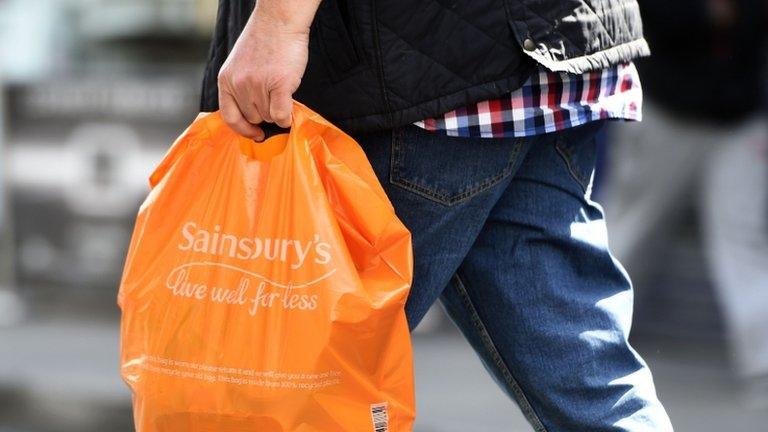Brexit: Supermarkets will get 'grace period' for NI food
- Published
- comments
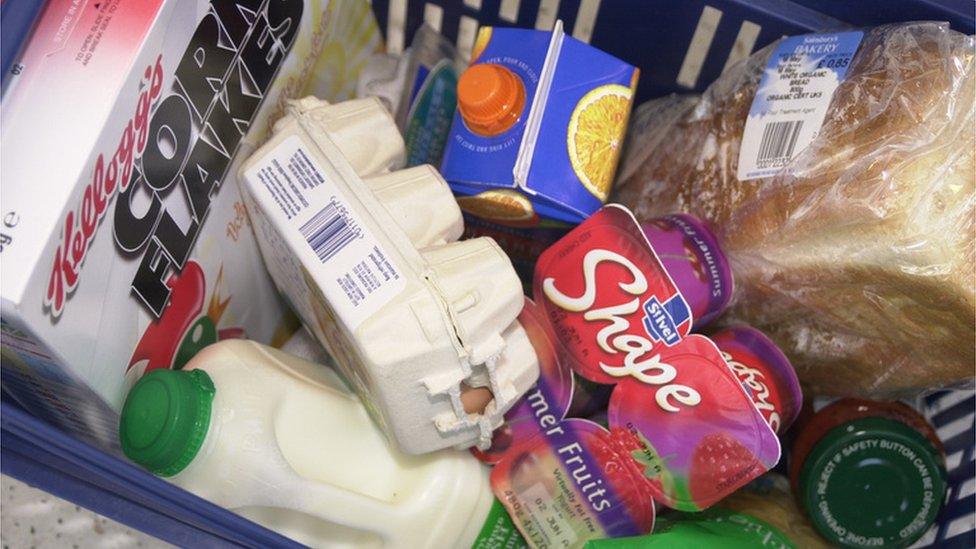
Supermarkets will be given extra time to phase in new checks, ensuring food supplies from GB to Northern Ireland do not face disruption from 1 January - whether or not there is a Brexit deal.
This will allow supermarkets to adapt their systems to deal with new Brexit controls required by the EU.
It is part of the agreement reached between the UK and EU on how the new Irish Sea border will operate.
The rules will apply whether or not the two sides can agree a trade deal.
The so-called "grace period" will initially be for three months, with six months guaranteed for chilled meat products.
The UK and EU have also agreed, under the part of the original withdrawal deal that deals with Northern Ireland - known as the NI Protocol:
A trusted trader scheme, which means all goods going from Great Britain to Northern Ireland will not face any tariffs
There will be no European Union embassy in Northern Ireland but Brussels officials will be permitted at border checks in the region once the transition period ends
The supply of medicines from GB to Northern Ireland will also avoid disruption, with the industry granted a period of 12 months to adapt to the changes
On Wednesday, Downing Street said "very large gaps remain between the two sides" on a trade deal after Prime Minister Boris Johnson met European Commission President Ursula von der Leyen in Brussels.
The leaders agreed that "by Sunday a firm decision should be taken about the future of the talks", a source told the BBC.
Ursula von der Leyen confirmed that positions remained "far apart", adding that negotiating teams "should immediately reconvene to try to resolve these essential issues".
"We will come to a decision by the end of the weekend," she said.
'British sausages for Belfast'
Outlining details of the agreement reached with the EU on the NI Protocol in parliament on Wednesday, Cabinet Office Minister Michael Gove said the government had heard "loud and clear" the concerns of supermarket firms and that more flexibility was needed.
From 1 January, Northern Ireland will stay in the EU single market for goods, but the rest of the UK will leave.
That means a proportion of food products arriving in Northern Ireland from Great Britain will need to be checked.
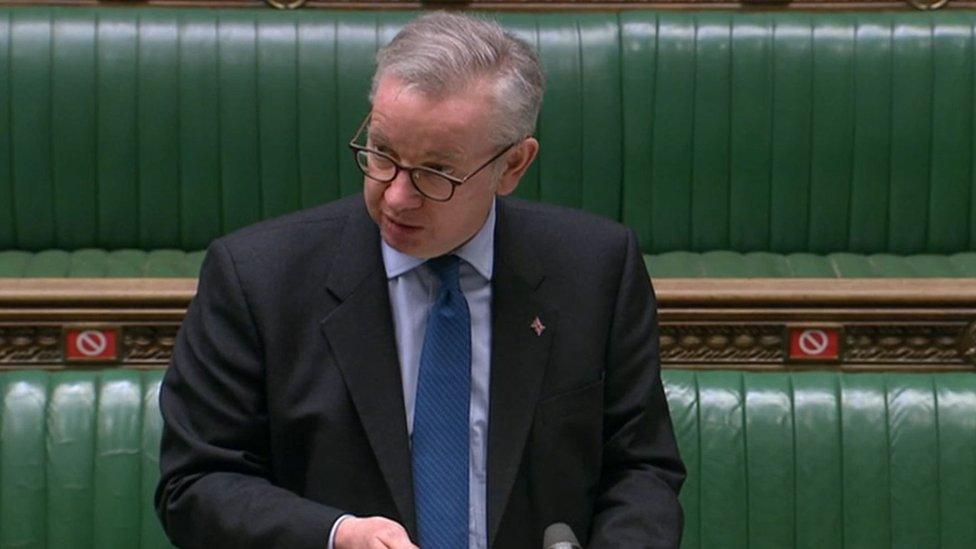
Michael Gove outlined the contents of the agreement in the House of Commons
The EU has strict rules on products of animal origin: meat, milk, fish and eggs.
These products must enter through a border control post where paperwork is checked and a proportion of goods are physically inspected.
Several supermarket chains had warned the supply of some products from GB to NI could be reduced, due to extra administrative burdens.
On Wednesday, Britain's biggest supermarket Tesco said it was stockpiling food ahead of a potential no-deal Brexit.
Mr Gove said the agreement "also prevents any disruption at the end of the transition period on the movements of chilled meats".
"British sausages will continue to make their way to Belfast and Ballymena in the new year," he added.


There is going to be a hard Brexit but the EU and UK are trying to give Northern Ireland a soft landing.
The immediate fear about disruption to the flows of supermarket goods across the Irish Sea is addressed with a three-month "grace period".
But what happens after that?
Will there be time to negotiate a more durable arrangement or is this about giving supermarkets time to source more goods on the island of Ireland?
And what about those food suppliers which aren't supermarkets?
They are anxiously seeking more details.
Read more: 'Devil in detail' as NI deal gets guarded welcome

But Sir Jeffrey Donaldson, the Democratic Unionist Party (DUP) Westminster leader, said "safeguarding the union is not a three-month project" - but an enduring commitment.
He asked Mr Gove to commit, if necessary, to introducing ongoing "safeguard measures" to maintain unfettered access between Northern Ireland and Great Britain.
The DUP had opposed the protocol in Parliament, arguing it would create a divide between NI and the rest of the UK that threatened to break up the union.

Brexit - The basics
Brexit happened but rules didn't change at once: The UK left the European Union on 31 January 2020, but leaders needed time to negotiate a deal for life afterwards - they got 11 months.
Talks are happening: The UK and the EU have until 31 December 2020 to agree a trade deal as well as other things, such as fishing rights.
If there is no deal: Border checks and taxes will be introduced for goods travelling between the UK and the EU. But deal or no deal, we will still see changes.

Mr Gove said the government had delivered on its commitment to ensure unfettered access for NI firms shipping goods to the rest of the UK.
"No additional requirements will be placed on NI businesses for these movements, with the very limited and specific exception of trade in endangered species and conflict diamonds," he said.
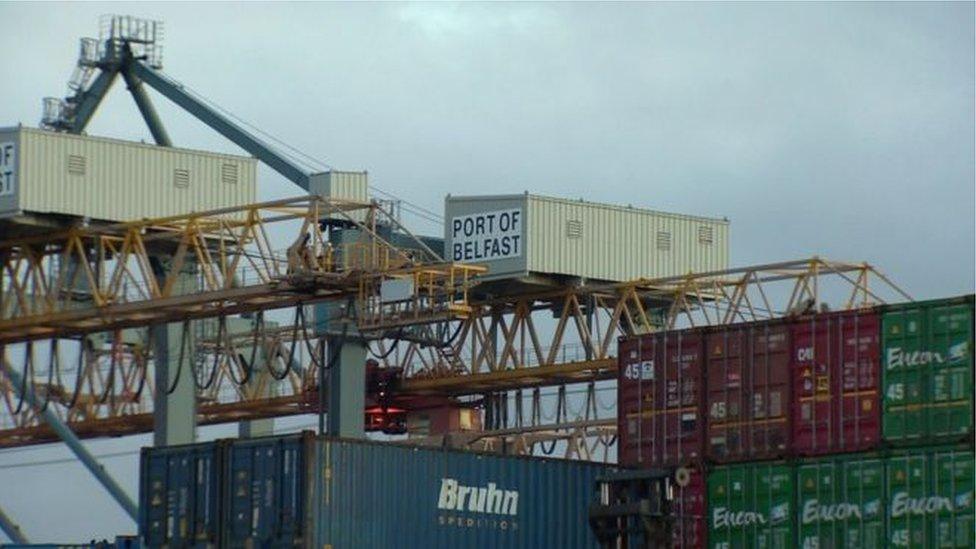
Belfast Port will be one of the locations where officials will continue to enforce EU customs codes after 1 January
The Northern Ireland Protocol created a category of "at risk goods".
These are goods which the EU fear could travel from GB through NI into the Republic of Ireland and the wider EU, without paying the correct EU tariff.
The protocol makes a provision for tariffs to be charged on these goods.
It was feared that a large proportion of goods going from GB-NI could have attracted tariffs in this way.
"Internal UK trade will be protected as we promised - whether we have a free trade agreement or not," said Mr Gove.
The "at risk" goods problem would be almost entirely solved if there was a trade deal between the EU and UK, eliminating tariffs on all goods.
But in the absence of a trade deal the trusted trader scheme would minimise the issue.
The government also confirmed there will be an EU presence in NI after 1 January, but Mr Gove said it would not amount to a "Belfast mini-embassy".
"The EU officials will not have any powers to carry out checks themselves," he said, adding there would be "sensible and practical" cooperation and data sharing on both sides.
Downing Street said it remained committed to peace and prosperity in Northern Ireland and that NI Secretary Brandon Lewis would shortly set out further measures of financial support to help businesses and communities in NI.

What is the Northern Ireland Protocol?
Its fundamental purpose is to prevent a hardening of the land border between Northern Ireland and the Republic of Ireland.
It does that by keeping Northern Ireland in the EU's single market for goods and by having Northern Ireland apply EU customs rules at its ports.
That means goods arriving from Great Britain are supposed to be checked and controlled at Northern Ireland's ports from 1 January.
This arrangement will apply whether or not a wider trade deal is agreed.
It will also mean when relevant EU laws are amended or new ones are drawn up, they will apply in Northern Ireland.
Under the plan, NI will leave the EU customs union with the rest of the UK at the end of this year, but will continue to enforce the EU's customs code at its ports.


Related topics
- Published9 December 2020
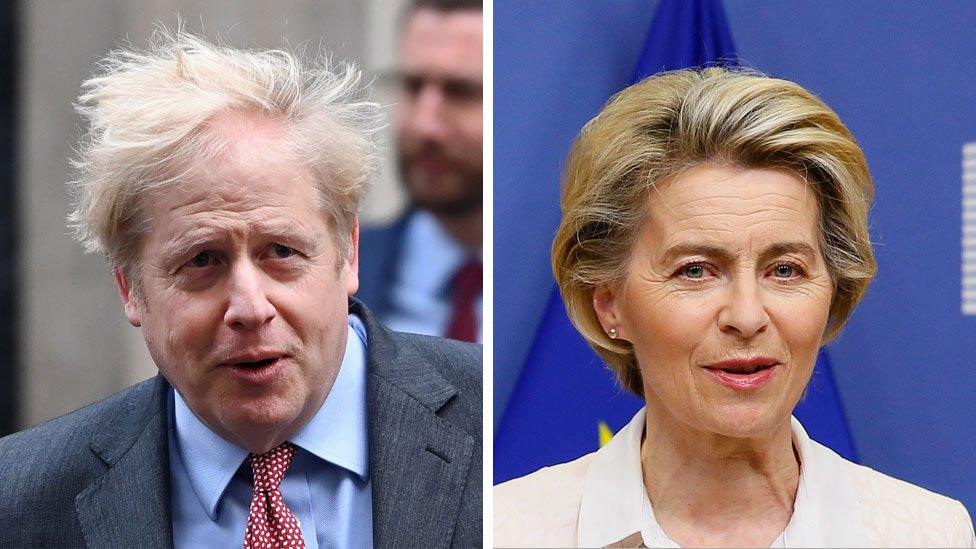
- Published13 December 2020
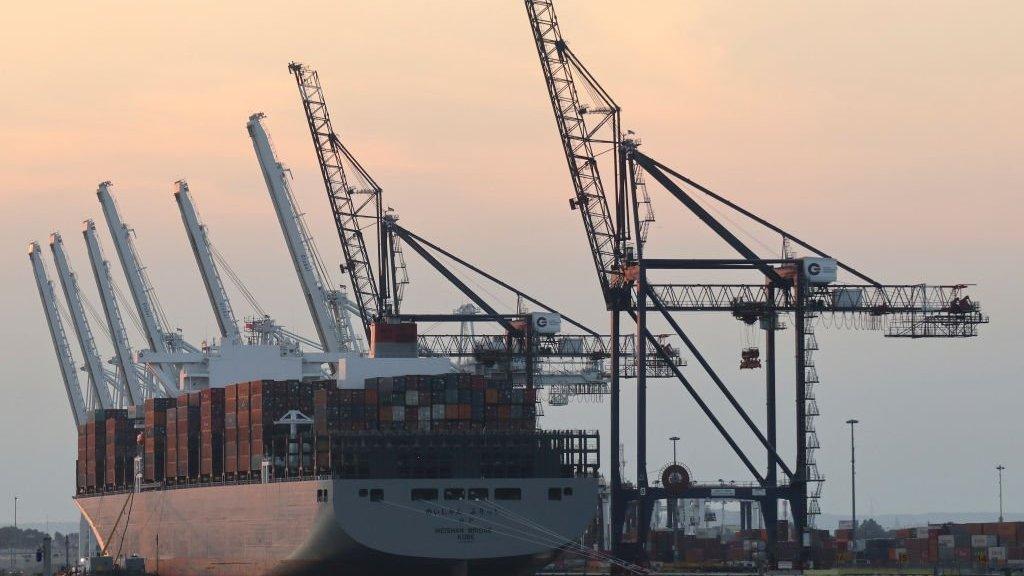
- Published8 December 2020
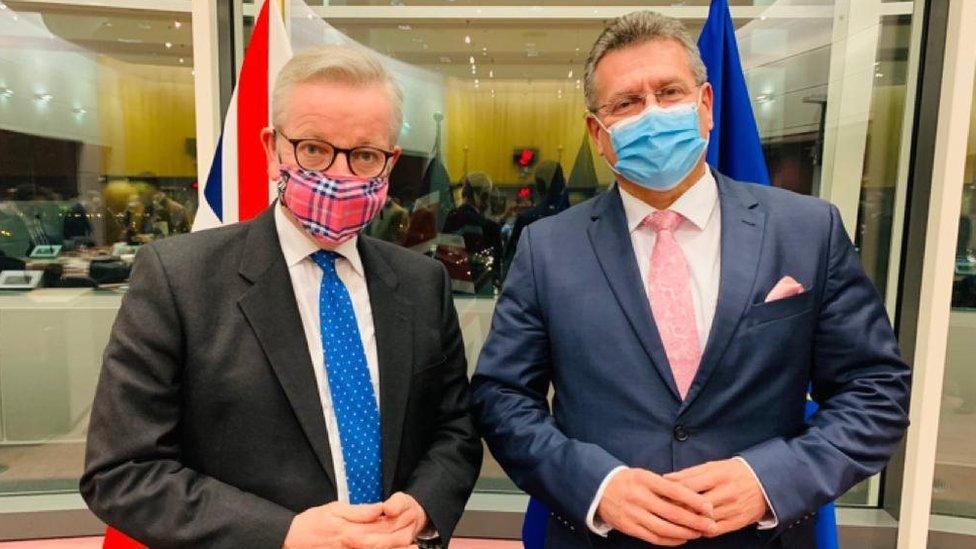
- Published2 February 2024

- Published6 November 2020
